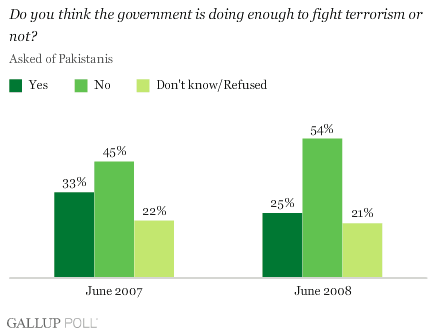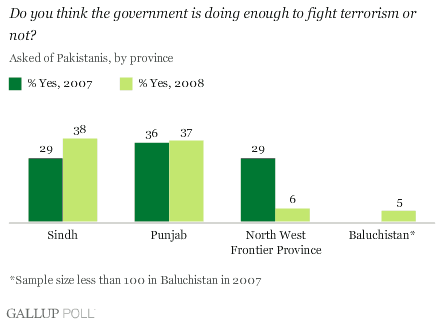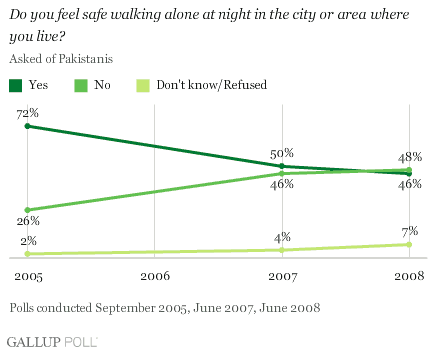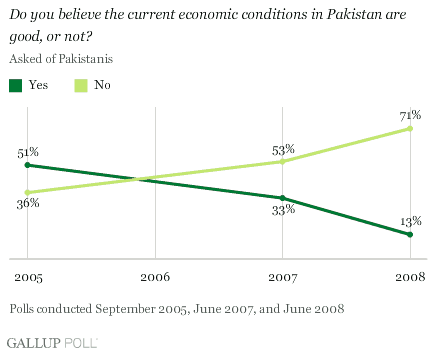WASHINGTON, D.C. -- After a nearly nine-year absence, civilian rule returned in Pakistan Tuesday, when widower of slain Pakistani leader Benazir Bhutto, Asif Ali Zardari, was sworn in as president. Gallup Polls in Pakistan reveal increasing frustration with efforts to fight terrorism -- one of two major challenges for the new leader -- with a majority of Pakistanis (54%) in June 2008 saying the government is not doing enough, up from 45% in 2007.

Zardari, who views the threat of global terrorism as one of the chief challenges facing Pakistanis, vowed Tuesday that his country will "stand together" with Afghanistan in the war against terrorism. The president's promise, if kept, may help reassure Pakistanis whom Gallup Polls show were growing increasingly skeptical of the previous government's efforts to combat a rising militant insurgency. Between June 2007 and June 2008, when President Pervez Musharraf was still in power, the percentage of Pakistanis who said their government was doing enough to fight terrorism deteriorated from 33% to 25%.
Pakistanis living in provinces along the Afghanistan-Pakistan border, which some consider a haven for the Taliban and al-Qaeda, are by far the most dubious of their government's efforts to fight terrorism. In North West Frontier province and in Baluchistan, Gallup observed drastic drops from 2007 to 2008 in residents' perceptions that the government was doing enough to fight terrorism. In Punjab and Sindh, provinces far removed from borderlands, evaluations of the government's efforts stayed the same or improved somewhat.

Rising violence and the government's perceived ineffectiveness to quell it may have contributed to the erosion in Pakistanis' general feelings of personal security. According to the latest Gallup Poll, fewer Pakistanis than ever say they feel safe walking alone at night in the areas where they live.

The Economy
In addition to dealing with the country's worsening security problems, Pakistan's new president also will be contending with rapidly deteriorating economic conditions. After several good years of economic expansion, Pakistan's economy is slowing, severely hampered by soaring consumer price and food price inflation, an extremely weak currency, and risky national debt.
Only three years ago, a slim majority of Pakistanis (51%) gave positive assessments of the country's economy, but their most recent opinions reflect the worsening situation. A record-low 13% of Pakistanis surveyed in June, when consumer price inflation hit a 30-year high and food price inflation soared to 32%, said economic conditions in the country are good.

Looking ahead, few Pakistanis are optimistic that the country's economic situation will improve. Only 10% of citizens surveyed in June said they think the country's economy is getting better, which represents a huge drop from the 45% who said this in 2005 and the 26% who said this last year. Commensurate with their lack of confidence in the country's economy, only 27% of respondents surveyed in June said their standard of living was getting better, compared with 53% who said so in 2005 and 48% who said so in 2007.
Pakistan's Future
Many Pakistanis' hopes are pinned on Zardari's ability to bring political and economic stability to the nation and make the country's return to democracy successful. On the other hand, there will be mounting pressure from the United States to see significant efforts in fighting terrorism with a considerable financial stake attached to it. The coming months will see a serious test of Zardari's ability to walk the political tightrope and address the twin dragons of terrorism and the economy -- at the same time.
Survey Methods
Results are based on telephone and face-to-face interviews with approximately 1,000-1,500 adults, aged 15 and older, conducted in 2005, 2007, and 2008, in Pakistan. For results based on the total sample of national adults, one can say with 95% confidence that the maximum margin of sampling error is ±3 to ±5 percentage points. In addition to sampling error, question wording and practical difficulties in conducting surveys can introduce error or bias into the findings of public opinion polls.
